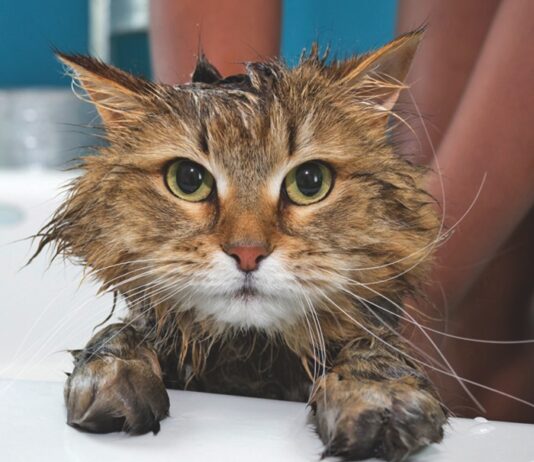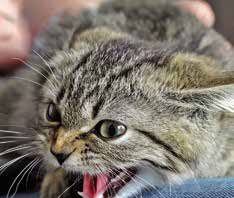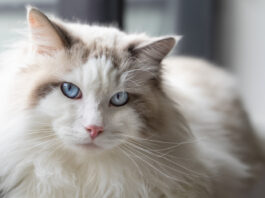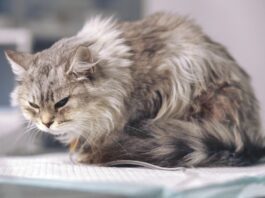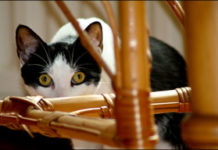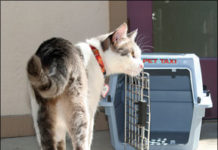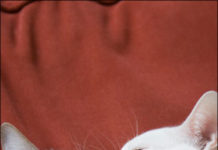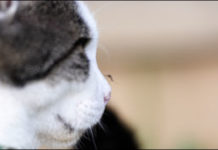Make Safe Cat-Dog Introductions
Some folks are "dog people," while others have an affinity for cats. But what do you do when enthusiasts of both persuasions share the same home? Despite the conventional wisdom that dogs and cats cant peacefully coexist, both species can inhabit the same space without the fur flying. However, introducing a cat into a dog-centric home requires planning, patience and a commitment to the process. How long it takes to successfully integrate a new cat with a dog depends on the situation, says Katherine Houpt, VMD, PhD, board-certified by the American College of Veterinary Behaviorists and emeritus professor of animal behavior in Cornell Universitys College of Veterinary Medicine. "It can take anywhere from days to weeks, and it varies a lot with the dogs reaction," she says. "I think its important to increase exposure gradually when doing an introduction so you can monitor both animals reactions. That usually happens over a number of days."
Cats and Kids Living Together Safely
Who isnt charmed by the image of an adorable kid holding and petting a cute, fluffy kitten? Children can benefit from having a cat, and vice versa. "The experience of bonding between the child and the cat can be invaluable," says Larry Lachman, PsyD, a licensed clinical psychologist, animal behavior consultant and author of Cats on the Counter: Therapy and Training for Your Cat, "and a child learns to increase compassion and empathy for nonhuman life."
Ask Elizabeth: October 2010
My main concern is that Buster, a fierce hunter of mice, will bring about an early demise to any small pets we bring home. Do you have any tips on keeping Guinea pigs (or other small creatures, since Im sure that, once we bring home one, others will follow) safe from cats in the home? And will these precious little beings be stressed, living in the home of a proud hunter? I wouldnt want them to live an unhappy life!
The Danger of Cat Bites
Buddy, a streetwise stray cat that had been rescued from a vacant parking lot, took great exception to a male cat spraying the front door of his adoptive home. To even out the turf war, Buddy decided to launch a counter attack - by spraying the inside of the door. "I saw Buddy positioning [to spray], so I tried to scoot him away from the door," explains Nancy Peterson, information specialist for the Humane Society of the United States in Washington, D.C. "He bit me. It wasnt just a little tooth scratch, either. It was a nice bite," she says. As a former veterinary technician, Peterson was quite aware of the health risks that a cat bite poses -even when the cat is up-to-date on its veterinary care and is vaccinated against rabies.
How to Soothe Your Scaredy Cat
Whenever cat owner Susan Lomond turns on her printer, her cat Sylvester dashes over to sit on it, lie on it and watch in fascination as the paper comes out. But when Susans friend Diana turns on her printer, her cat, Petra, flees in terror. Cats respond differently to noise depending on their personalities and experiences - and even their genetics. When cats get scared of noise, we often feel the need to protect them. Heres what you can do to help your cat cope with noise. Scary Sounds. Cats differ from dogs when it comes to being frightened by noise. Dogs are notoriously afraid of thunder and fireworks, and will often try to escape from the house in a panic.
Your Cats Keen Sense of Smell
When it comes to nosing around, a cat has a major advantage over its human caregiver. The adorable feline that occupies your house has a whopping 60-to-80 million olfactory cells compared to a humans five-to-20 million cells. Because of their well-equipped noses, cats may use their sense of smell as the primary way of interacting with their environment. "They have a large olfactory area in the nose and do a lot of sniffing," says Katherine A. Houpt, VMD, PhD, the emeritus James Law Professor of Animal Behavior at Cornells College of Veterinary Medicine.
The Meaning of the Mouse
Does your outdoor cat regularly deposit small, dead rodents on your doorstep? Or does your indoor cat seem to take pride in hunting down large, ugly bugs in your apartment and leaving them at your feet? Believe it or not, your cat is not bringing you a gift, according to animal behaviorists. "Your cat is actually bringing you a mouse to teach you to hunt and kill it," explains Katherine A. Houpt, VMD, the former James Law Professor of Animal Behavior at Cornell Universitys College of Veterinary Medicine. "Its the same thing the mother cat does for her kittens." Cats are born with a chasing and hunting instinct, but not necessarily the skills to go along with it. The mother cat teaches her kittens to kill and eat prey. (Indoor cats may chase and kill mice, but they will rarely eat them.)
How to Ease Cat Carrier Stress
You need to take your cat to the veterinarian for a checkup. When you retrieve the cat carrier from the closet, your cat disappears. The ensuing chase tires you out and stresses your cat, making his heart beat faster and possibly elevating his temperature. Sound familiar? For many cat owners, getting their cats into a carrier is a battle of wits and wills - but its necessary preparation for veterinary visits, emergency evacuations or moving to a new location. "You may even want to put your cat in a carrier to keep her from escaping when painters or housekeepers come," says Ellen Lindell, VMD, a board-certified member of the American College of Veterinary Behaviorists. So why wait until an emergency arises? Getting your cat accustomed to the carrier simply takes foresight and training.
What To Do About Cat Fights
While fighting among cats is not typical behavior, it certainly does happen in the multicat household. Read on to learn some reasons why cats pick fights with each other - and what you can do about it. All kittens play, practicing to defend themselves by arching their backs, jumping on each other, chasing each other and maybe exchanging a few nips on the ears. "The difference between playing and fighting," says Katherine A. Houpt, VMD, emeritus professor of animal behavior at Cornell Universitys College of Veterinary Medicine, "is that when playing, cats take turns chasing each other. There isnt one dominant aggressor or one main victim. Nobody hides."
The Female Cat in Heat
The yowls of a cat in heat are unmistakable. When a female cat needs to mate, you should expect incessant crying, strange posturing and constant attempts to escape outdoors to waiting males. The best thing you can do about your cat in heat is to prevent it from happening in the first place. Its a smart idea to have her neutered before her first heat cycle. However, sometimes thats not possible. So if youve never witnessed a cat in heat, heres what you should expect.
Your Cats Strange Table Manners
If your cat has ever scratched the floor before or after eating a meal, attempted to cover uneaten food, or plopped a favorite toy into her food or water dish, please raise your hand. Right now, many of you are probably waving your hand in the air and nodding your head knowingly. If suppertime at your house has more the ambience of a junior high school cafeteria than a chic caf, read on. Our Cornell experts help make sense of some of our cats quirkiest food-related behaviors. Eating Etiquette. Scratching around their bowls or trying to cover food is a common, albeit puzzling behavior seen in many cats. Just why our fastidious felines do this remains a mystery, but several theories have been suggested.
Your Cats Whiskers
The old-fashioned term "the cats whiskers" means the height of perfection or first-rate. Popular in the 1920s, this expression, along with "the cats meow," referred to the daring flappers described as "impossible to shock." While the term is American in origin, people have disagreed over who deserves credit for coining it. Regardless, the phrases meaning shows that the people who first used the expressions certainly understood the unique capabilities of your felines most sensitive hairs. Cat whiskers - also called tactile hairs - are found on your cats eyebrows, chin, cheeks and in an area behind its forelegs above the paw. They are two to three times thicker than other hairs and taper to a fine, flexible tip. Approximately 12 of these stiff bristles align in four rows that protrude from either side of the cats muzzle. The top row moves independently of the middle row.

